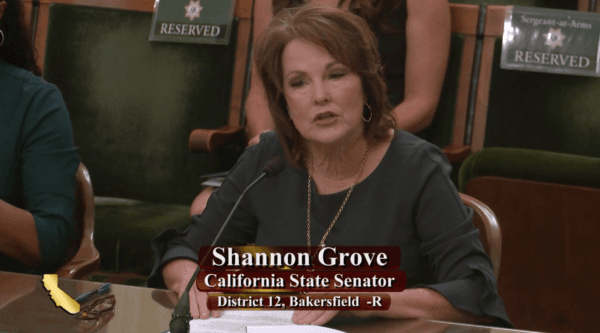A California bill that would add child sex trafficking to the list of serious felonies and increase penalties for those repeatedly convicted of such crimes passed the state Assembly Appropriations Committee Sept. 1, thus allowing the measure to continue for further consideration by the Legislature.
Senate Bill 14, authored by Sen. Shannon Grove (R-Bakersfield), was originally a part of the suspense file—where bills with larger fiscal impact are evaluated collectively.
Following the committee’s decision, the senator thanked parents and Californians for participating in the political process.
“The public getting involved in this piece of legislation was the pivotal thing that made this happen,” Ms. Grove told The Epoch Times. “They were responding on social media. We have 10,000 petitions in a wagon. We had people blowing up the phones, calling every day to the Appropriations Committee.”
The measure passed the Senate earlier this year with bipartisan, unanimous support but met resistance in the Assembly Public Safety Committee in July.
Following public outrage, an unprecedented special hearing was called two days later where all but two Democratic members of the committee switched their votes to yes and allowed the bill to pass.
“People getting involved in their government makes the biggest difference,” Ms. Grove said. “Your opinion matters. They’re there to represent you.”

Sen. Shannon Grove, R-Bakersfield, speaks during a committee hearing in Sacramento on July 11, 2023. (California State Assembly/Screenshot via The Epoch Times)
Opposition to SB 14 came from some who feared that victims of trafficking who have been forced to participate could be charged with serious felonies.
The Appropriations Committee recommended amendments before passing the measure, which was accepted by the author. Ms. Grove said such were affirmations of existing statutes protecting victims from prosecutions.
“The language inserted this morning by the Assembly Appropriations Committee just affirms to make sure that victims of human trafficking can’t be wrapped up in the role of perpetrator,” Ms. Grove said in a video press conference announcing the bill would move forward. “That was never the intent of the bill, and that’s why we had the standard language in there to protect them, as well.”
Co-authored by 64 lawmakers and supported by dozens of groups across the state, the bill will now head to the Assembly for consideration.
“I am excited that it’s taking one step forward to the Assembly floor ... where 46 members are co-authors,” Ms. Grove told reporters in the press conference. “If the media hadn’t pulled back the curtain on what quietly happens in this building, this bill could have died 50 days ago.”
Assemblywoman Diane Dixon (R-Newport Beach), fellow co-author and member of the Assembly Appropriations Committee, celebrated the bill’s passage from the suspense file, where many bills die, and highlighted the need for urgent action to stop human trafficking in California.
“I am delighted that Senate Bill 14 passed out of Committee today,” Ms. Dixon said in a statement emailed to The Epoch Times after the decision was made. “We rank as the number one state in the United States for human trafficking cases, with more than 1,300 identified in 2021. Additionally, California is ranked number one in the nation when it comes to victims.”
If the measure passes the Assembly, the Senate will reconsider the amended version, and if passed by Sept. 14, the bill will be sent to the governor’s desk for signature.

California Gov. Gavin Newsom speaks during a news conference in Sacramento, Calif., on Jan. 10, 2022. (Rich Pedroncelli/AP Photo)
Gov. Gavin Newsom expressed his desire to work with the bill’s author and the Legislature in July when the bill stalled in the Assembly’s Public Safety Committee.
“Human trafficking is a sick crime. We must do more to protect vulnerable people, especially kids,” a spokesperson for the governor’s office told The Epoch Times by email July 13.
Ms. Dixon said the sheer number of victims dictates the need to prioritize the measure.
“We need policies like SB 14 to become law in California in order to change these statistics,” she said. “Let’s get it signed!”












